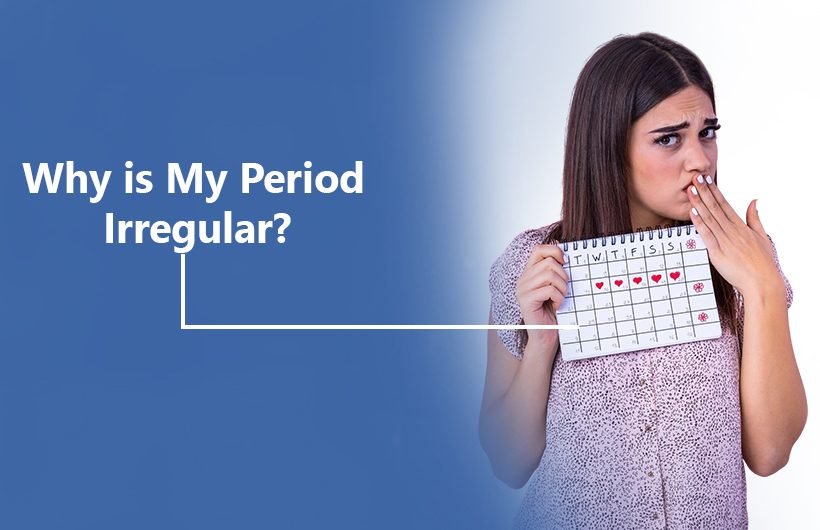Many women experience irregular periods at some point in their lives. As an endocrinologist, I often hear the question: “Why is my period irregular?” It’s completely understandable to feel anxious when your cycle doesn’t follow its usual pattern. Your menstrual cycle is more than just a monthly event; it’s a sensitive indicator of your hormonal health. Let’s explore why this happens, when it’s normal, and when it’s a sign to seek professional help.
What is an Irregular Period?
A typical menstrual cycle lasts between 21 to 35 days, counting from the first day of one period to the first day of the next. While a few days of variation here and there is common, cycles that are consistently shorter than 21 days, longer than 35 days, or vary greatly month to month are generally considered irregular.
Irregular periods can mean:
- Skipping a month or more entirely
- Periods are coming much earlier or later than expected
- Unpredictable flow (very heavy or unusually light)
In most cases, a hormonal imbalance is at the root of these changes.
Why is My Period Irregular?
So, why is my period irregular? As an endocrinologist, I can assure you that hormones play a huge role in regulating your cycle. When they fluctuate or become imbalanced, your menstrual pattern can easily be thrown off. Some common hormone-related causes include:
PCOS (Polycystic Ovary Syndrome)
PCOS is one of the most frequent reasons for irregular periods. Women with PCOS may ovulate irregularly or not at all, leading to missed or delayed periods. Other signs include acne, excessive hair growth, and weight changes.
Thyroid Dysfunction
Your thyroid gland helps regulate metabolism and influences menstrual hormones. Both hypothyroidism (underactive thyroid) and hyperthyroidism (overactive thyroid) can cause periods to become irregular.
Insulin Resistance
Women with insulin resistance often have higher circulating insulin levels, which can disrupt ovarian function and lead to irregular periods.
High Prolactin Levels
Prolactin is a hormone primarily responsible for triggering milk production in the breasts. However, elevated levels (hyperprolactinemia) can interfere with ovulation, causing missed or delayed periods.
Lifestyle Factors
- Stress: Emotional stress affects the hypothalamus, the part of your brain that controls hormones. This can easily delay or skip ovulation.
- Rapid weight changes: Sudden weight loss or gain can disturb hormonal balance.
- Extreme exercise: Athletes or those with intense workout routines may stop ovulating temporarily.
If you’re wondering again, why is my period irregular? These are the most common medical and lifestyle reasons.
Why is My Period 2 Months Late?
One of the more alarming situations is missing periods for two months or longer. Many women immediately think of pregnancy, but if that’s ruled out, why is my period 2 months late?
Some possible explanations include:
- Chronic stress: Long-term stress can keep the body in a state where it deprioritises reproductive functions.
- Thyroid disorders: As mentioned, an underactive or overactive thyroid can completely disrupt cycles.
- PCOS: Irregular ovulation means it’s common for women with PCOS to skip cycles altogether.
- Recent changes in contraceptives or medications: Starting, stopping, or switching birth control pills or certain other drugs can temporarily disturb your menstrual rhythm.
If your period has been absent for two months and you’re not pregnant, it’s a good idea to get evaluated to rule out underlying hormonal problems.
Why Did My Cycle Change from 28 to 35 Days?
Another common concern is, Why did my cycle change from 28 to 35 days? It’s important to know that slight variations are usually normal. Stressful weeks, travel, or even minor weight fluctuations can delay ovulation by a few days, making your cycle longer.
However, if your periods consistently extend beyond 35 days, it could indicate:
- PCOS or insulin resistance
- Thyroid dysfunction
- Early signs of perimenopause (if over 40)
Any persistent change, especially with other symptoms like acne, hair thinning, or unexplained weight gain, warrants a closer look.
When to See an Endocrinologist
While occasional irregularity is often harmless, certain signs mean it’s time to consult a specialist:
- Missing periods for over three months (when pregnancy is ruled out)
- Cycles that occur unusually often (less than every 21 days)
- Exceptionally heavy flow (needing to change pads every 1 to 2 hours)
- Severe menstrual cramps that interfere with daily life
- New signs of hormonal imbalance, such as acne, hair loss, or unusual weight changes
A thorough hormonal evaluation checking thyroid levels, insulin, prolactin, and reproductive hormones can pinpoint the cause and guide appropriate treatment. As an endocrinologist, I specialise in these complex hormonal interactions and can help tailor a plan to restore your cycle’s balance.
Conclusion
To sum up, if you’ve been wondering why my period is irregular? Remember that occasional changes are common, but persistent irregularities could be your body’s way of signalling a deeper issue. Hormonal imbalances, stress, lifestyle shifts, or underlying conditions like PCOS and thyroid disorders are often to blame.
If you’re concerned about why my period is 2 months late or puzzled why my cycle changed from 28 to 35 days, don’t ignore these signs. Early diagnosis and personalised care make a significant difference in managing these issues.
If you’re looking for expert advice, an Endocrinologist in Ahmedabad, Dr. Moxit Shah, can help you understand the root cause and create a plan tailored to your hormonal health. Schedule a consultation today and take the first step toward better wellness.






